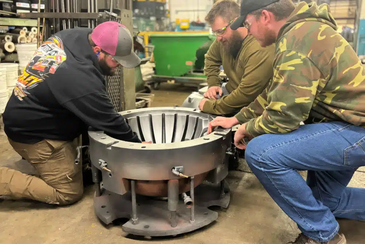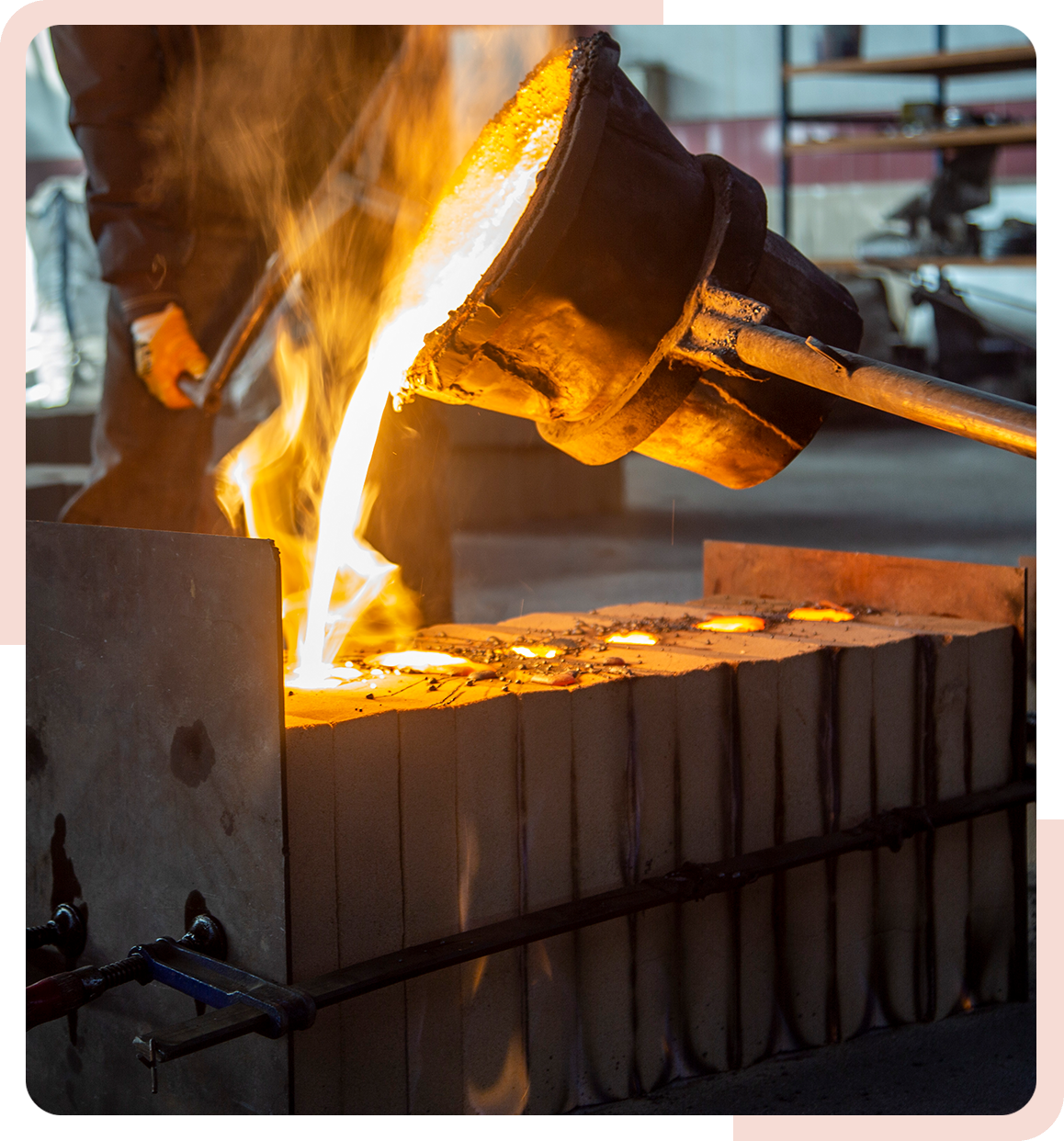How aluminum casting contributes to efficient manufacturing
Wiki Article
The Future of Aluminum Foundries: Trends and Technologies Forming the Market
The light weight aluminum factory industry is undertaking considerable change. Trick trends highlight the importance of sustainability and performance. Developments in clever production and automation are becoming widespread. Foundries are significantly concentrated on utilizing recycled materials. This change raises inquiries concerning future methods and innovations. Just how will these modifications effect production methods and market characteristics? The answers may redefine the sector landscape in unanticipated ways.Improvements in Smart Production Technologies
As the light weight aluminum shop industry evolves, developments in clever production technologies are becoming progressively necessary for boosting performance and efficiency. The integration of automation, synthetic intelligence, and the Web of Things (IoT) is changing conventional foundry operations. These modern technologies enable real-time tracking of procedures, enabling prompt adjustments that optimize result and lower waste.Device understanding algorithms assess production data to recognize patterns and anticipate upkeep requirements, reducing downtime. Robotics are increasingly used for repetitive jobs, freeing experienced employees to concentrate on even more complex difficulties. Additionally, digital doubles-- online designs of physical procedures-- assist in simulations that can improve layout and operational techniques.
The adoption of these clever production modern technologies is driving competitive advantages in the aluminum foundry industry. By streamlining workflows and enhancing decision-making capabilities, shops can satisfy growing market demands while preserving top notch requirements. The future of aluminum shops is unquestionably connected to these technical developments.
Welcoming Eco-Friendly Materials and Processes
The light weight aluminum foundry sector is significantly focusing on environmentally friendly products and processes to improve sustainability. This change includes the adoption of sustainable product sourcing, energy-efficient manufacturing techniques, and efficient recycling and waste monitoring techniques. By incorporating these techniques, factories intend to reduce their environmental effect while keeping competition on the market.Lasting Product Sourcing
Exactly how can light weight aluminum shops boost their sustainability initiatives? Sustainable product sourcing has actually become an important approach in achieving this goal. By focusing on recycled light weight aluminum, foundries can substantially decrease their ecological impact, as recycled materials require less energy and fewer sources contrasted to key light weight aluminum manufacturing. Additionally, sourcing products from licensed vendors who abide by eco-friendly practices advertises liable mining and lessens environmental impact. Shops are additionally checking out different materials, such as biopolymers and eco-friendly coverings, to match typical light weight aluminum processes. Working together with stakeholders, including suppliers and environmental companies, fosters development in sourcing approaches. Ultimately, embracing sustainable material sourcing not only aligns with international sustainability goals yet also settings aluminum foundries as leaders in ecologically liable production.Energy-Efficient Production Methods
Light weight aluminum factories are progressively taking on energy-efficient manufacturing methods to match their sustainable product sourcing efforts. These methods focus on lessening power usage throughout the manufacturing procedure. Advanced modern technologies, such as induction melting and maximized spreading processes, are being applied to reduce the total carbon impact. Additionally, automation and smart production systems enhance functional performance, enabling for much better energy monitoring. Shops are likewise exploring the assimilation of renewable resource sources, such as solar and wind, to power their procedures. By focusing on energy performance, aluminum shops not only reduced manufacturing costs yet likewise straighten themselves with worldwide sustainability goals, guaranteeing a more eco responsible strategy to aluminum production while meeting the increasing demand for eco-friendly methods in the industry.Recycling and Waste Administration
Welcoming environment-friendly materials and procedures, aluminum foundries are focusing on recycling and waste administration techniques to enhance sustainability in their operations. By integrating closed-loop systems, these centers are minimizing waste and taking full advantage of source effectiveness. Scrap aluminum, a conveniently available material, is being reused on-site, considerably reducing the need for virgin products and decreasing power consumption. Technologies in sorting and processing innovations even more assist in the recycling of aluminum, making certain that even contaminated materials can be repurposed successfully. In addition, factories are taking on sustainable methods such as minimizing unsafe waste and advertising making use of naturally degradable materials for packaging. This commitment to recycling not only lowers environmental impact but also improves the economic feasibility of light weight aluminum shops in an open market.The Duty of Automation and Robotics
Automation and robotics are significantly changing the light weight aluminum shop market, considerably enhancing manufacturing effectiveness. By integrating sophisticated innovations, foundries can reduce labor prices while all at once enhancing safety standards for their workforce. This shift not only simplifies procedures however likewise positions the industry for lasting growth in an open market.Improved Production Efficiency
Revolutionizing manufacturing processes, the integration of advanced robotics and automation technologies has actually ended up being a foundation for aluminum shops looking for enhanced efficiency. These developments streamline operations, reduce cycle times, and boost product quality by lessening human error. Automated systems can keep track of production lines in real-time, permitting immediate changes that optimize result. Additionally, robotics help with the handling of harmful products, ensuring safer working environments while enhancing throughput. Anticipating maintenance technologies likewise add to efficiency by expecting tools failings, therefore decreasing downtime. Consequently, aluminum shops can achieve higher uniformity in their products while reacting extra promptly to market needs. This welcome of automation is setting a brand-new requirement for performance and functional excellence within the market.
Lowering Labor Prices
The shift towards advanced robotics and automation in aluminum factories not only boosts production performance yet additionally plays a considerable function in decreasing labor expenses. By integrating automated systems, factories can lessen the dependence on hands-on labor, which commonly entails high incomes and training expenditures. Robotics simplify recurring tasks such as putting, molding, and completing, permitting a higher output with fewer personnel. This technical adjustment not only decreases labor-related costs but additionally boosts uniformity and high quality in manufacturing. Automation can operate around the clock, taking full advantage of operational hours without the connected expenses of overtime or change differentials. Consequently, aluminum foundries can attain substantial cost savings while maintaining affordable prices in a developing market landscape.Improving Security Standards
While conventional aluminum factory operations often reveal workers to hazardous atmospheres, the integration of robotics and automation significantly boosts security criteria within the market. Automated systems can carry out risky jobs, such as liquified metal handling and heavy training, decreasing human direct exposure to harmful problems. Furthermore, robotics can run in extreme temperature levels and toxic ambiences, efficiently lessening the danger of injury. Advanced keeping an eye on technologies and synthetic intelligence assurance real-time safety analyses, permitting instant feedbacks to potential dangers. Automation simplifies operations, lowering the probability of crashes caused by human error. Consequently, the fostering of these modern technologies not only boosts safety however likewise cultivates an extra productive and effective working environment in aluminum factories.Enhancing Energy Effectiveness in Production
As aluminum factories look for to preserve competition in my response a developing market, improving energy efficiency in production has become a crucial focus. By adopting innovative modern technologies such as high-efficiency melting heaters and automated temperature level controls, factories can significantly reduce energy intake. Applying real-time tracking systems enables click for more exact tracking of energy use throughout the manufacturing procedure, enabling quick modifications to optimize effectiveness.Furthermore, shifting to different power sources, including eco-friendly options, can even more lower the carbon impact. The integration of power healing systems, which reclaim waste warmth for reuse, is coming to be increasingly usual. Training personnel in power administration methods guarantees that every person associated with the manufacturing process is mindful of power usage.
These efforts not only reduced operational prices however likewise straighten with international sustainability objectives, positioning light weight aluminum foundries as accountable gamers in the market while improving their total competition. - aluminum casting
Technologies in Recycling Aluminum
Advancements in recycling aluminum have gotten energy alongside efforts to boost power performance in production. The light weight aluminum sector has accepted innovative innovations that simplify the recycling process, reducing power intake and environmental impact. Methods such as hydrometallurgy and brand-new sorting technologies improve the extraction of aluminum from scrap, boosting return prices and guaranteeing greater quality recycled material.
The development of closed-loop recycling systems allows foundries to recycle aluminum without considerable deterioration in top quality, making the process a lot more sustainable. Developments in logistics and collection, including enhanced tracking systems and automated sorting, have likewise played a crucial duty in boosting the effectiveness of aluminum recovery. These developments not only contribute to a circular economy however also help reduce the carbon footprint connected with aluminum production. As the demand for lasting techniques grows, these technologies place the aluminum factory market as a leader in accountable resource management.
Reacting to Market Needs and Consumer Trends
Adaptability has actually ended up being a foundation for light weight aluminum factories replying to developing market demands and consumer fads. As sectors significantly prioritize sustainability, aluminum foundries are changing in the direction of eco-friendly techniques, including enhanced reusing processes and reduced carbon impacts. This shift lines up with customer preferences for eco accountable items, driving factories to introduce their offerings.Additionally, the surge of light-weight materials in auto and aerospace fields demands innovations in aluminum alloys and casting strategies. Shops are purchasing research study and advancement to produce high-strength, lightweight parts that satisfy rigorous performance requirements.
Modification has gotten grip, with consumers seeking customized solutions. Aluminum shops are leveraging sophisticated production technologies, such as 3D printing, to fit details client requirements effectively. This responsiveness not just satisfies consumer needs however likewise placements aluminum factories competitively in a vibrant market landscape, guaranteeing their relevance in an ever-changing commercial setting.

Regularly Asked Inquiries
Just How Do Light Weight Aluminum Foundries Influence Local Economies?
Aluminum foundries significantly affect local economic climates by creating jobs, stimulating need for neighborhood suppliers, and contributing to area development. Their procedures usually cause boosted tax profits, which can money vital public solutions and infrastructure improvements.What Are the Safety And Security Laws for Aluminum Shop Employees?
Security regulations for light weight aluminum factory workers include obligatory individual safety tools, proper air flow systems, routine training on hazardous products, and adherence to guidelines established by job-related health and wellness managements to reduce risks and assurance worker security. - Aluminum Casting CompanyExactly How Does Light Weight Aluminum Recycling Affect Global Supply Chains?
Aluminum reusing considerably decreases need for resources, enhances source performance, and supports rates. This change impacts global supply chains by fostering a round economic climate, advertising sustainability, and making certain a more resistant industry in changing markets.What Career Opportunities Exist in the Aluminum Shop Industry?
Numerous profession chances exist in the light weight aluminum shop market, including duties in engineering, quality assurance, production monitoring, and research and advancement. Competent labor positions such as Recommended Reading mold manufacturers and machine drivers are also in demand.Just How Do International Trade Policies Influence Light Weight Aluminum Foundries?
International profession policies substantially impact light weight aluminum shops by impacting import tolls, supply chain characteristics, and market access. These elements can influence operational prices, competitiveness, and overall productivity within the global light weight aluminum production landscape.By focusing on recycled light weight aluminum, factories can considerably lower their environmental impact, as recycled products require less power and fewer resources contrasted to primary aluminum production. Light weight aluminum shops are significantly taking on energy-efficient production techniques to complement their lasting material sourcing campaigns. Automation and robotics are significantly changing the aluminum foundry sector, considerably improving production performance. The change towards advanced robotics and automation in aluminum factories not only boosts manufacturing performance but additionally plays a significant duty in lowering labor prices. As light weight aluminum shops look for to maintain competition in a developing market, enhancing energy effectiveness in manufacturing has actually arised as an important focus.
Report this wiki page